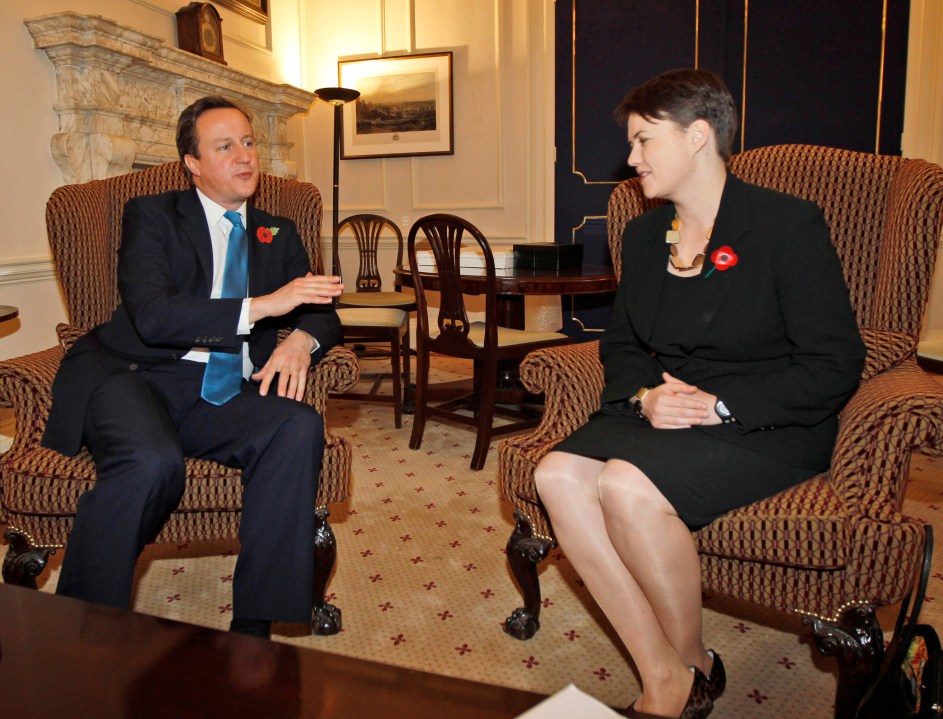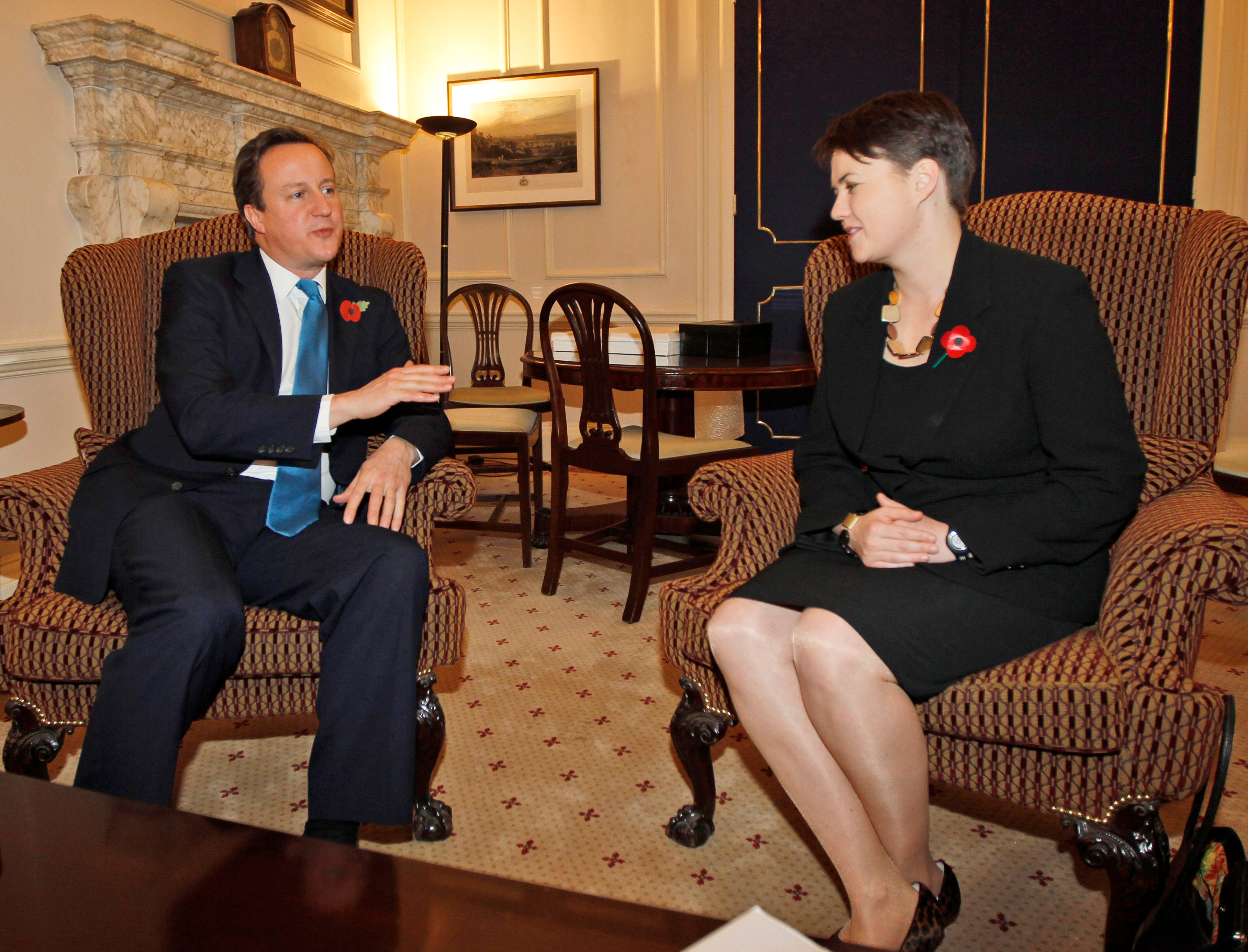Ruth Davidson became leader of the Scottish Conservative and Unionist Party in large part because she was the candidate favoured by the party establishment. Where Murdo Fraser suggested – rather too boldly as it turned out – the party should fold its tent and start again under a new banner, Davidson preferred a more cautious approach. Moreover, she said it was time to “draw a line in the sand” on the matter of transferring further powers to the Scottish parliament.
A little more than a year later it seems as though that line has been washed away by the tide. Perhaps it was a mistake to draw it in the first place. Davidson gave a speech yesterday in which she hinted – albeit only in broad terms – that the Scottish Tories are prepared to countenance some – albeit as yet undefined – form of fiscal autonomy for Scotland. If you think I think that it’s about bleedin’ time that happened then you’d be right.
Alan Cochrane was not impressed by the lack of detail on offer and, as so often, he has a point. But it was better than nothing even if it is also the case that talking about the need to differentiate the Scottish Tories from their brethren south of the border is the hoariest of familiar chestnuts. For that matter, we’ve had 15 years of Scottish Tory leaders apologising for the party’s past sins and pleading to be given a semi-fair hearing from now on.
Nevertheless, this was a modest step in the right direction. Or it could be. If it is followed up. Davidson has opened the door to a more interesting, more useful Scottish Conservatism. The press now expects something to happen. It would be useful if that something did actually happen. This time. At last.
I wrote about it all for today’s Scotsman. Attentive, long-time readers may be familiar with the argument but, hell, here it is again:
In the present circumstances, Tory ideas matter more than the number of Tories returned to Holyrood. The Conservative task is to act as a battering ram deployed to smash the cosy “Scottish consensus”. This requires picking a few subjects, developing effective arguments and hammering the SNP and Labour again and again and again.
Why, Davidson could usefully ask, has devolution become an obstacle to reform rather than a means of delivering real change? Why is the Scottish NHS now less productive than its English counterpart? Why, most especially, do Scotland’s schools fail so many pupils? Davidson’s speeches are full of fine assertions on these matters but too often the detail is lacking. Should it not be considered a national scandal, for instance, that only 7 per cent of Glaswegian state-educated pupils will leave school with five good passes at Higher? Is it not embarrassing that, across the country, only 12 per cent of state school pupils achieve this “gold standard”?
A policy is not necessarily better just because it is swathed in tartan. Too often, in fact, Scottish distinctiveness is allowed to cover-up, or otherwise excuse, mediocrity. We are not as good as we like to think we are. This is not “talking Scotland down”; it is exhorting Scotland to do better.
The Conservatives should not be afraid of controversy. The years of sheepish, timorous, apologies should be put behind them. The Tories have served their penance. This is no time for hair-shirt Conservatism. On the contrary, the Conservatives have useful things to say on public sector reform, on welfare, and on taxes. The Tories job is to be Holyrood’s awkward squad, pointing out uncomfortable truths and demanding something better.
And:
It is apparent that Scots wish Holyrood to become something akin to a proper parliament. That is, one that has significant revenue-raising powers in addition to its present spending competencies.
Had they enjoyed even a modicum of gumption these past dozen years, the Tories could – and should – have been at the front of this debate. Instead they are, yet again, lagging behind.
Fiscal autonomy – or Devo-max or however else you wish to describe it – should be at the heart of the Tories manifesto. It is, after all, a conservative principle that a parliament lacking the power to tax is a parliament destined to favour bigger, more expensive, more interfering government.
One suspects, however, that the Tories have been feart of favouring revenue-raising powers for Holyrood for fear this would lead to Scotland being more heavily taxed than other parts of the United Kingdom. That may be a reasonable fear. But, if so, then this too reinforces the regrettable notion that the Scottish Conservative and Unionist party does not trust Scotland to manage a greater share of its own affairs. When the national mood has been “Yes, we can” the Tories have sucked their thumbs and whimpered “Actually, we probably can’t. And even if we could, we shouldn’t.”
Whole thing here. But there’s this too: if you call your speech “Scotland First” and suggest this is a new approach it does rather risk reinforcing the negative stereotypes about the Tories that your speech is seeking to counter. Time, perhaps, to move on from this self-abasement.
UPDATE: I commend the Peat Worrier’s take on this to you. Is smart stuff.








Comments